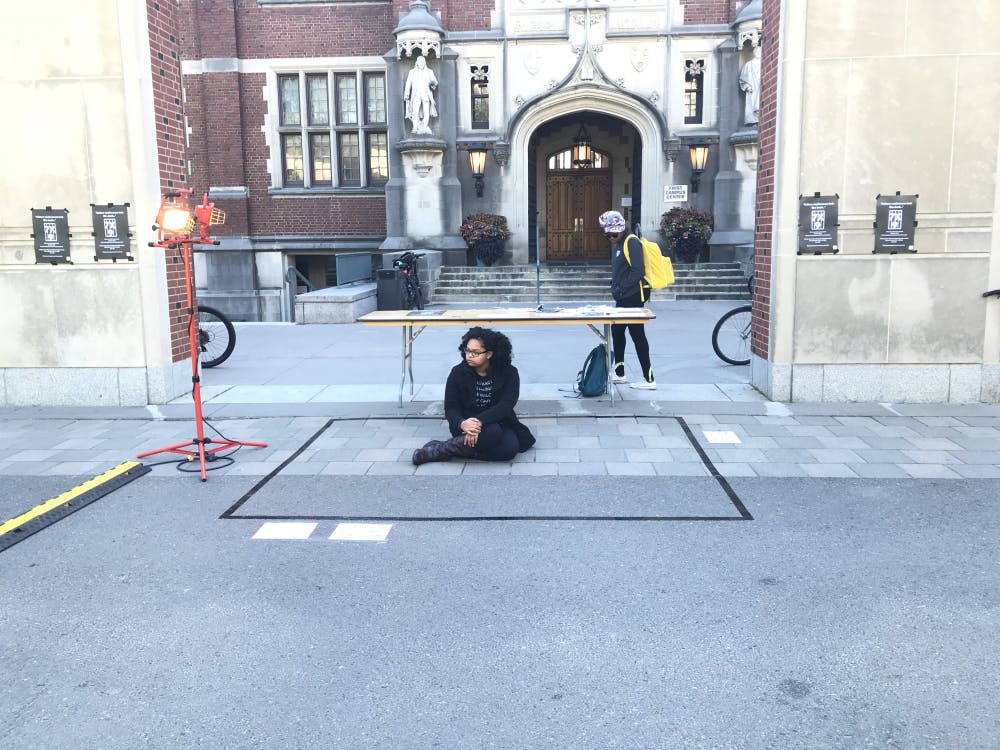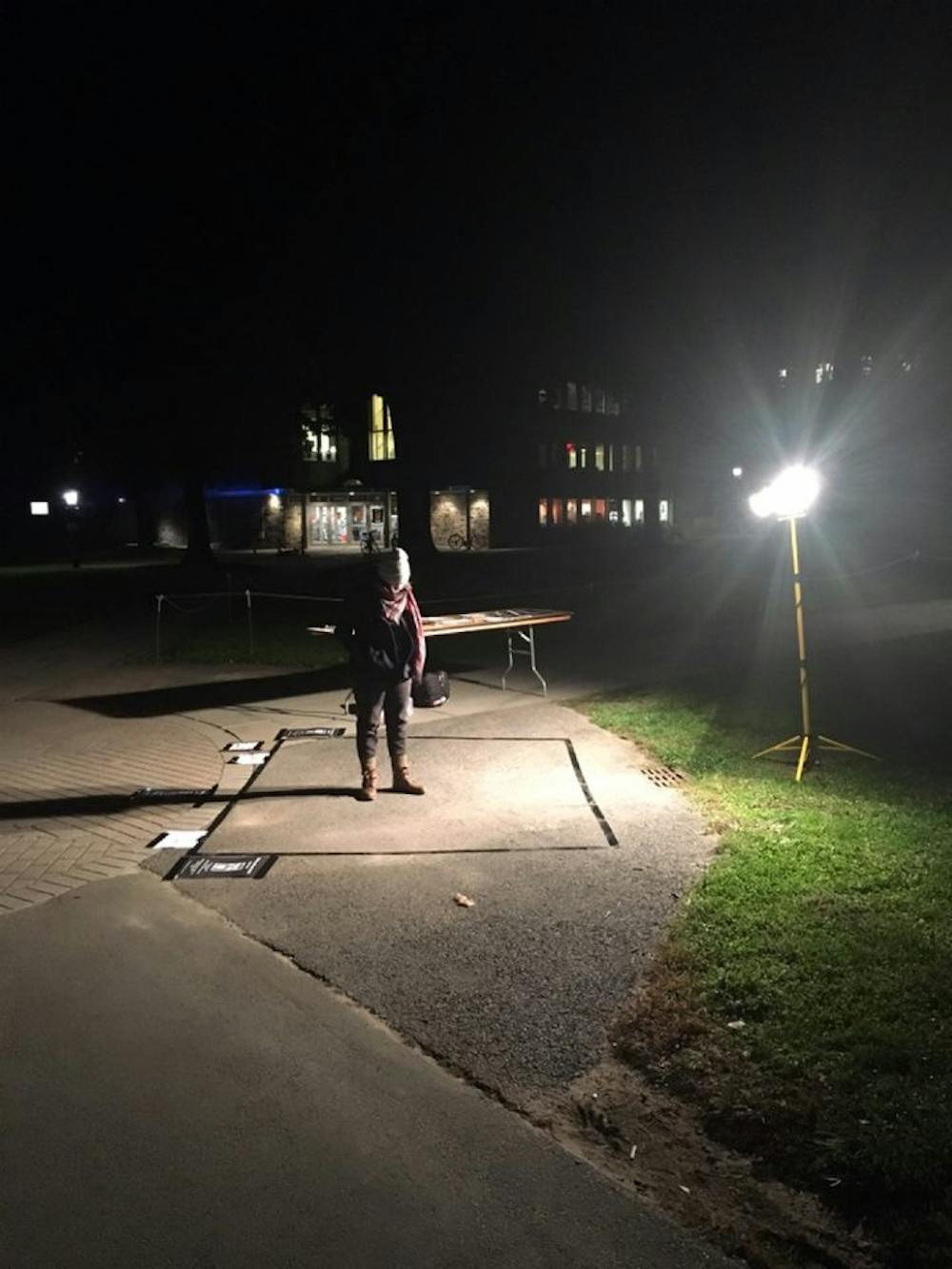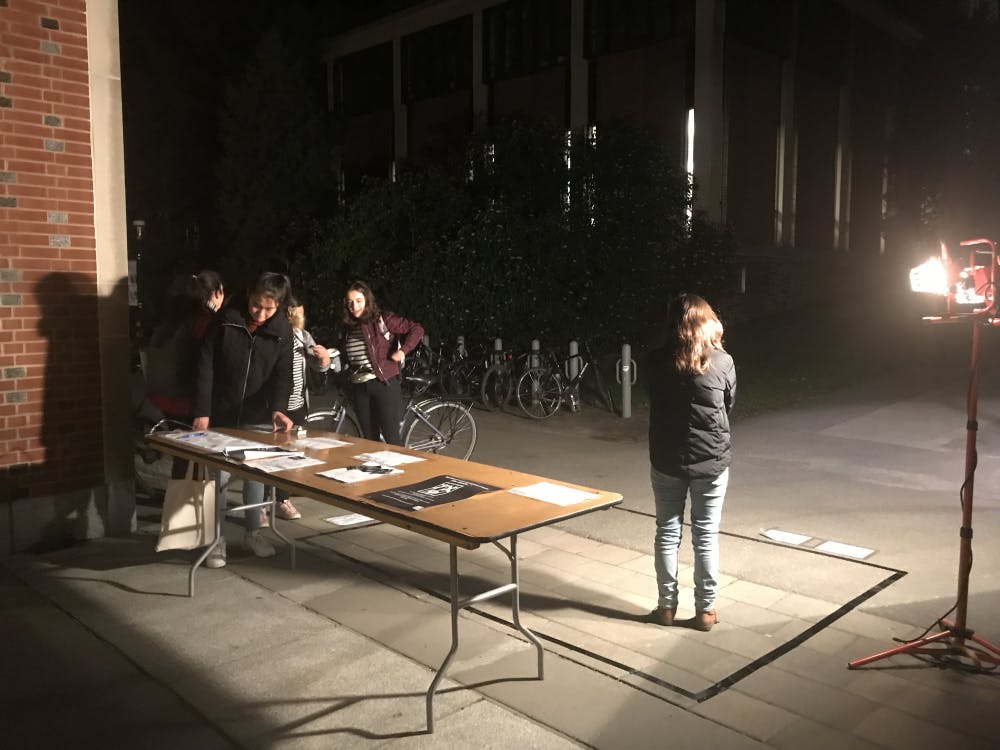In the annual protest against solitary confinement, students stood in an outlined box smaller than their dorm rooms, persisting day and night to demonstrate a reality that, for many, does not end when the sun comes up.
On Thursday, Oct. 18 and Friday, Oct. 19, 46 students volunteered to participate in the Princeton Students for Prison Education and Reform protest of inhumane solitary confinement practices, which lasted a total of 23 hours. The volunteers stayed isolated in a 7’ x 9’ square, both in front of Frist Campus Center and in the U-Store Plaza, for one hour each.
SPEAR’s 7 x 9 protest encouraged over 100 students to sign up for Project Solidarity, an effort to have students exchange letters with individuals in solitary, encouraged students to donate to Lifelines to Solitary which “enables Solitary Watch to keep in touch throughout the year with one more person living in solitary confinement,” and pushed students to vote for representatives that stand against solitary confinement.
According to SPEAR’s request for volunteers, the protest represents the “23 hours that individuals are confined to their cell daily … for the remaining hour, people in solitary confinement are sometimes allowed in a slightly larger, yet still isolated ‘pen’.”
The protest culminated in a talk by former New Jersey State Prison inmate Ojore Lutalo.
Beatrice Ferguson ’21, who participated in the protest, said, “I participated in the protest because I think that people need to be reminded of the reality that such torture continues to occur every single day. Also, I think the 7 by 9 protest, by actually placing physical bodies in these small spaces, can convey the cruelty of solitary confinement in a uniquely powerful way.”

She thinks the protest is important because “just having people pause and think for a moment about the fact that the brutal torture that is solitary confinement occurs every day is a really powerful thing.”

People who stopped to look at the protest noticed handouts with basic information on solitary confinement, as well as signs asking them not to interact with protestors.
According to the handout, those in solitary confinement often receive inadequate healthcare and sensory deprivation, and, partly as a result, “commit 50 percent of prison suicides despite being only 4 percent of the prison population.”
Ferguson related her one hour in the 7’ x 9’ square to how she imagines solitary confinement.
“While in the box, I was struck by just how small and constricting the space is. Your ability to move freely was completely restricted in a way that is unhealthy for all human beings. The cruelty of placing someone in such confinement for days on end is heartbreaking,” Ferguson said.

Protest viewers could also pick up laptop stickers saying “End Solitary,” as well as information about issues with solitary confinement legislation, specifically former Governor Chris Christie’s 2016 veto of the Isolated Confinement Restriction Act, which would have limited the use of isolated confinement in New Jersey.
Princeton students might be surprised to learn that New Jersey ranks among the top states with the highest percentage of prisoners in solitary confinement.
According to a Marshall Project article that was distributed at the protest, on an average day in December 2015 in New Jersey, “four hundred and nine prisoners, or 40 percent of those in administrative segregation, had been isolated for periods exceeding six months, including 137 who had been isolated for more than a year.”
To convince people to join the resistance against solitary confinement, SPEAR’s handout emphasizes that “Solitary is NOT fiscally responsible,” as it costs up to three times as much for a solitary confinement prisoner than for a general population prisoner.
It has also been shown to be an ineffective punishment that leads to increased prison violence and rates of re-incarceration .

Participant in 7x9 protest in U-Store Plaza around 3:00 a.m. on Friday 10/19.
SPEAR specifically sought to bring awareness to the disproportionate number of black people and religious minorities in prison and in solitary confinement.
The speaker Lutalo, a black man, was held in solitary confinement for 22 of his 28 years in prison. SPEAR asked him to come to the University.
“It is SPEAR's top priority to amplify the voices of those who have been impacted by the penal system,” said SPEAR co-president Micah Herskind ’19.
Since his days in solitary confinement, Lutalo has been creating political graphics that speak out against social injustice, including collages that classify solitary confinement as genocide.
He had conversations with many students and encouraged them to read about revolutionary thinkers and to be critical when evaluating and voting for representatives.
Herskind says that “with a new administration, we anticipate new legislation and another chance to end solitary in New Jersey.”
The protest was held from Thursday, Oct. 18 at 5 p.m. until Friday, Oct. 19 at 4 p.m., culminating in a well-attended talk by Ojore Lutalo, a formerly incarcerated man, in Frist 302.








